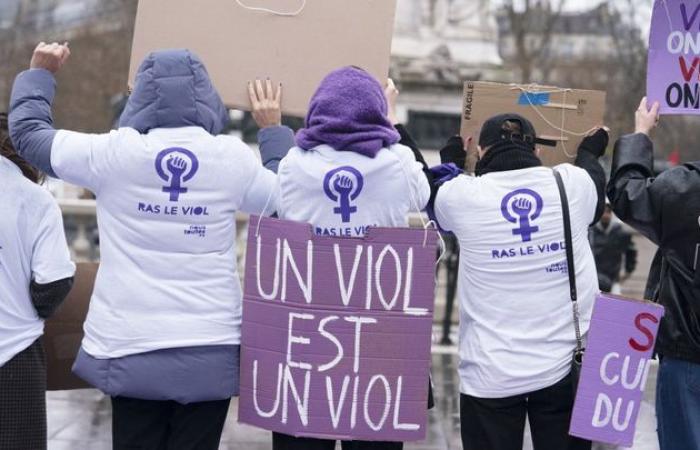“It’s time to act”. A parliamentary report, published Tuesday January 21, recommends “to integrate the notion of non-consent in the criminal definition of rape and sexual assault”. “Lack of clear definition” in the law, the “consent is often exploited by the attackers (…), which fuels stereotypes about rape, complicates the filing of complaints and leads to numerous dismissals, to the detriment of the victims”justifies the information mission, led by deputies Véronique Riotton (Together for the Republic) and Marie-Charlotte Garin (Les Ecologistes).
In Belgium, the notion of consent is already present in the Penal Code; en Spain, sexual intercourse without explicit consent constitutes rape since the entry into force in 2022 of the so-called law “Only a yes is a yes.” In France, thehe question of a criminal redefinition of rape, to which Emmanuel Macron said he was in favor, divides both among legal professionals and in the ranks of feminist associations.
A bill, incorporating the conclusions of the parliamentary report, was tabled Tuesday afternoon by the two deputies and the presidents of their respective groups. How does the text intend to integrate the notion of consent into the Penal Code? Franceinfo spoke with Marie-Charlotte Garin, co-rapporteur of the mission behind the report and co-signatory of the bill.
Franceinfo: After more than a year of work, what are the conclusions of the parliamentary mission on the criminal definition of rape?
Marie-Charlotte Garin : Our conclusion, even if we did not wait for the parliamentary mission to find out, is that there is a climate of impunity for sexual violence in our country. And we have become firmly convinced that the law must be changed, by modifying the Penal Code to introduce the notion of consent. But not at all costs.
That's to say ? How do you define the notion of consent in your proposed law?
We propose to introduce consent while respecting several axes, in particular by retaining the four criteria of the current definition of rape and sexual assault, that is to say the use of violence, threat, coercion or surprise, because they have already produced case law. Non-consent is added to these four already existing criteria.
We have an entire paragraph on what consent is. It is specified that it must have been given freely, that it is specific, that it cannot be inferred from silence or the absence of resistance and that it can be withdrawn before or during the act of a sexual nature. Finally, it must be assessed in light of the surrounding circumstances: if the person consents with a gun to their head, we can imagine that they are not really consenting.
Will this new definition allow the justice system to take up cases of sexual violence that escape it today?
By broadening the definition of rape and sexual assault beyond the four existing criteria, we give judges an additional tool to better assess the situations they are faced with. During the hearings we conducted, magistrates explained to us that they believed the victims in front of them, but that they did not have the means to characterize the facts, because they did not respond to one of the four criteria of violence, threat, coercion or surprise.
“The addition of the criterion of non-consent will make it possible to better appreciate the phenomenon of astonishment of victims, which concerns a majority of rapes.”
Marie-Charlotte Garin, MP Les Ecologistesat franceinfo
It is also a criterion which will make it possible to better consider cases where victims' vulnerabilities are exploited, for example when there is a hierarchical link with the perpetrator.
Some believe that these situations are already covered by the Penal Code. The law already provides that constraint can be moral, for example. What do you oppose to this argument?
-I hear the argument that says “it's already taken into account”. But sometimes it's better to say things clearly. The experts we interviewed told us that the judicial treatment was haphazard, and that depending on the judges and their use of case law, you did not obtain the same judgment. Our proposal clarifies the law, so that the treatment is less random, so that everyone can have the same reading level and so that there is no doubt.
The law is a reflection of society, it is normal that it evolves with society and that it reflects the values it wants to protect. Fifty years ago, marital rape was not in the law and it was considered that a husband had the right to impose sexual relations on his wife. Since then, the law has evolved. Today, after the trial of Gisèle Pelicot's attackers [durant lequel le non-consentement de la victime a été beaucoup discuté]it seems obvious to me that it needs to evolve again.
Feminist activists are concerned that the introduction of the notion of consent focuses the investigation on the behavior of the victim and not that of the accused. And this while the legal process is already trying for the victims. What do you answer them?
This is a fear that we heard during our hearings. In reality, the investigators' focus is already on the victim: how she behaved, how she was dressed, etc. ? Furthermore, the choice of wording that we made in the bill responds to this concern, since we tell the judge that he must be interested in the way in which the accused ensured that he had obtained the consent of the person in front of him. So the attention is definitely on him.
Isn't this, as some jurists fear, a “reversal of the burden of proof”, if the accused person must prove that he or she received the victim's consent?
I am always surprised to hear this argument, because in France the burden of proof does not rest on the prosecution, but on the public prosecutor. [c’est-à-dire le magistrat du parquet, qui dirige l’enquête menée par les forces de l’ordre, et qui propose à son issue une qualification pénale. L’affaire est ensuite jugée par un magistrat du siège, qui est un juge qui n’a pas pris part à l’enquête]. However, it will always be up to the public prosecutor to provide proof of what he puts forward. Simply, we give him an additional tool to do so, since we change the object of the proof, that is to say what is admissible to characterize the offense. We add an additional object of proof, which is non-consent.
Is your proposed law moving towards a “contractualization of sexual relations”, as its opponents denounce?
No, it's not about signing a contract, it's about clarifying existing law and the values that we protect in society. Rape culture is over, it's up to us to build a culture of consent. It's not about preaching, it's about mutual respect. In reality, we are already mobilizing consent on a daily basis.
“When we borrow a colleague’s pen or knock before entering their office, we are already asking for their consent, and that’s called communication.”
Marie-Charlotte Garin, MP Les Ecologistesat franceinfo
We are not here to be in controversy, we are here to clarify, to calm. We all want to see the next generations evolve in a world where it is normal to communicate, to respect each other and where we know what is acceptable and what is not.







